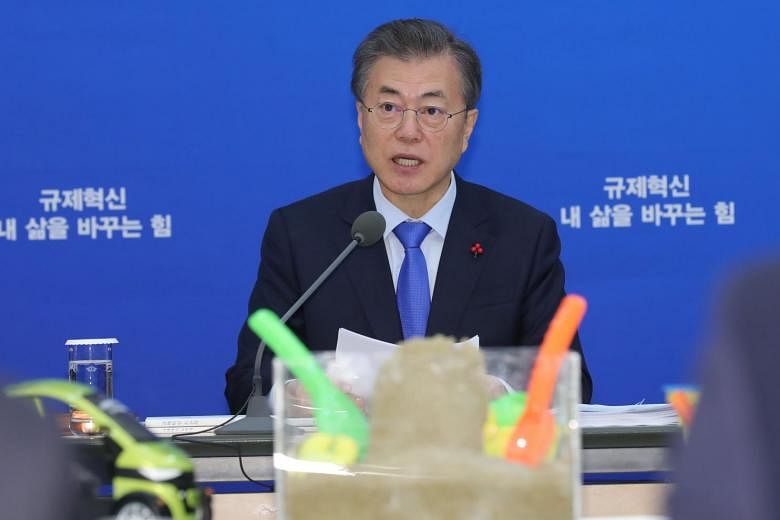SEOUL (BLOOMBERG) - A backlash against a minimum wage hike in South Korea shows the challenge facing President Moon Jae In as he seeks to become the "jobs president".
While millions of workers are happy with higher pay, others say employers are dodging the increases and even laying people off instead of paying them more.
Businesses complain that they can't afford to pay the new wage, which rose by 16 per cent to 7,530 won (S$9.30) an hour as of Jan 1.
The minimum wage has become the subject of global debate.
While places including Ontario and Seattle have pushed ahead with big increases, nationwide hikes like South Korea's have been rare. Its impact will be closely watched.
How Mr Moon handles the backlash and whether he can push the wage even higher could also determine the success of his administration's goal of creating jobs and giving more people a shot at a "decent life".
Though still relatively high, Mr Moon's approval rating in a Gallup poll last week dropped to 64 per cent, the lowest since he took office in May. Many cited the wage hike as one reason for their disapproval.
"Small businesses supported President Moon, who promised a fair economy and consideration for the vulnerable, but we are upset as we don't feel the benefits," said Choi Seung Jae, chairman of the Korea Federation of Micro Enterprise.
JOBS V WAGES
The latest increase is a key part of Mr Moon's plan to spur economic growth through consumption, with a goal of raising the minimum wage by another third to 10,000 won by 2020.
The current wage still lags that of South Korea's peers in the Organisation for Economic Cooperation and Development (OECD).
While hundreds of thousands of new jobs will be created this year, the wage hike is likely to reduce the number by 10,000 to 20,000, according to the central bank.
But it also expects the change to support private consumption and raise economic growth by 0.05 percentage point in 2018.
The impact will depend on how keenly employers abide by the law. About 14 per cent of South Korean workers were paid less than the minimum in 2016, and that ratio is expected to rise as the pace of increases accelerates.
According to a January survey by the Federation of Korean Trade Unions, 66 per cent of the surveyed 217 member unions said their employers were evading the hike by using loopholes such as counting incentives or welfare benefits as base salary or were cutting work hours.
Mr Moon has repeatedly emphasised the importance of a higher minimum wage, saying it is an "essential policy" to protect peoples' economic lives.
His administration has threatened to release the names of business owners who break the law. Those found guilty can also face fines of up to 20 million won or up to three years in jail.
Hundreds of petitions have been submitted to the presidential office via its website since the latest hike took effect. Petitions that attract signatures of more than 200,000 will elicit an official response from the presidential office or ministers.
One woman who said she had two children wrote that she was fired from the night shift at a factory as soon as the new wage took effect. The company told her it could no longer manage night-shift expenses, said the woman, who didn't give her name.
'TOO EARLY'
Business owners also complain that they are being hit hard by the change.
Yoon Chang Hyuk, who runs magnet-wire manufacturer Hwail Electronics Co., said he would have to consider expanding the company's China operations if the minimum wage keeps rising at a similar pace.
He suggested the wage remain on hold in 2019 until the government can assess the effects of the increase.
"The fundamental question of whether business owners can manage the higher wage burden should have been considered," Yoon said.
Oh Sang Bong, a research fellow at the Korea Labour Institute, said it's "a little too early" to say whether the harmful effects of the increase will outweigh the benefits.
"It would take at least a quarter to monitor data on jobs, and then consideration should follow regarding the pace of the next wage hike," Oh said.

